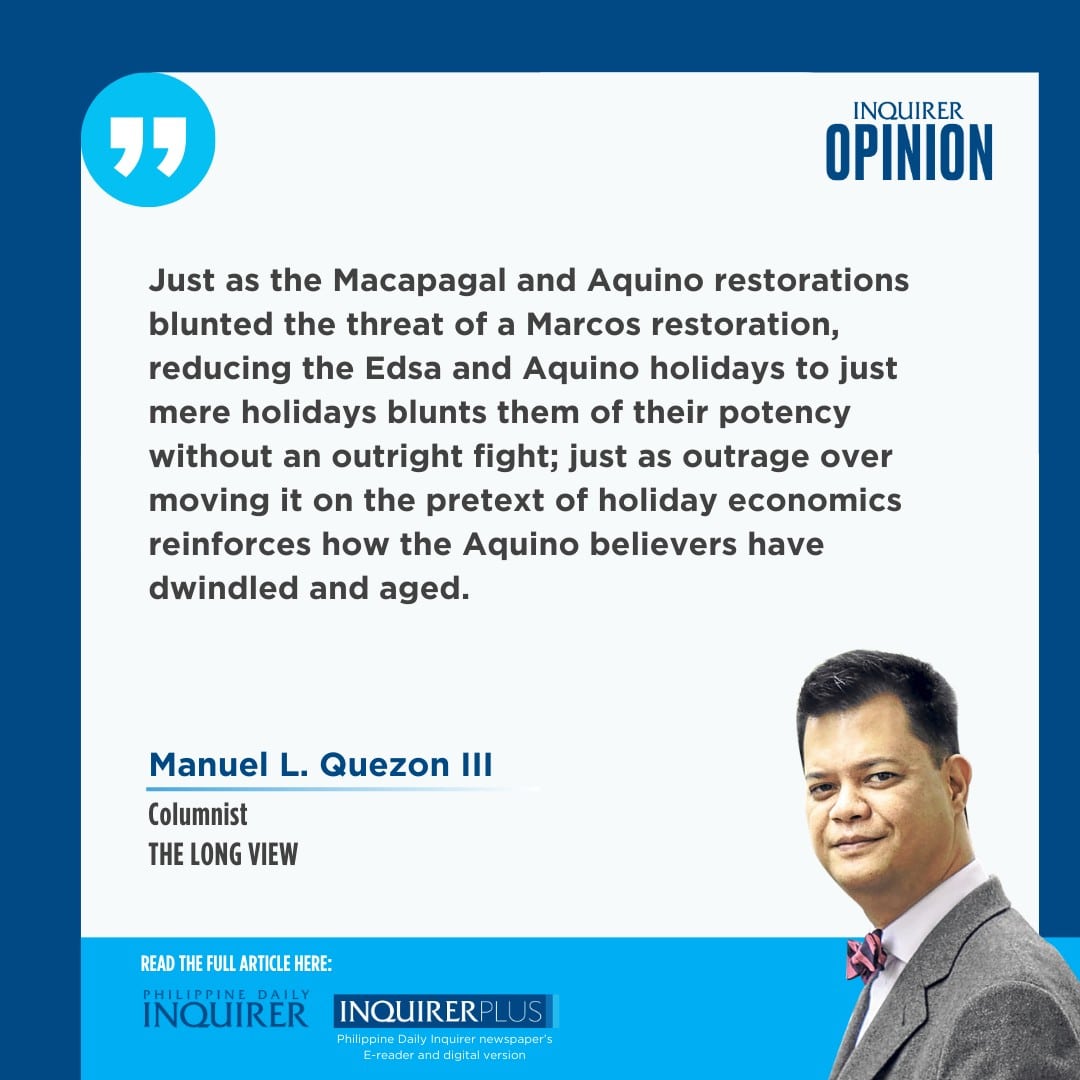Raissa Robles asked me what I thought about President Marcos moving the observance of Benigno “Ninoy” Aquino Jr. Day so as to make possible a long weekend—the latest chapter in Gloria Macapagal Arroyo’s innovation of “holiday economics.” After all, Ninoy Aquino Day became a holiday under her watch and became one of the holidays moved around to help create long weekends. Earlier this year, the Palace excused itself from including Feb. 25 in the list of holidays, because this year, it happened to fall on a Sunday.
I told Raissa it’s true that holiday economics does detach events from their actual historic dates. I’d add that politically speaking, the public on the other hand, especially those classes with the means to travel or otherwise enjoy leisure activities, appreciates long weekends: Opponents of long weekends thus risk coming across as pedantic sourpusses not least because of the hardly tangible connection many citizens have with what the holidays commemorate.
But a more important point, I’d suggest, is that so long as holiday or commemoration still exists, it represents a placeholder on the national collective consciousness. Here, the Marcoses are interesting. The President has proven more practical than, say, his sister who implicitly, if not explicitly, is the leading advocate of outright erasure. For his part, he, the President, who is a far less combative figure than his sister to begin with, seems content to have achieved rehabilitation by means of election. While he seems to have no problem with the assertion that Aquino and his death was part of a personal feud (thus absolving the Filipino people of complicity in his own father’s ouster), neither does he seem eager to do anything explicitly anti-Aquino, not least because the family of Ninoy and Cory themselves are no longer in politics.
I told Raissa it also situates the President as the nondisruptor, and even, the magnanimous one; and extracts him from an unwinnable return to past fights when he has already secured as mentioned above, rehabilitation through election.
Just as the Macapagal and Aquino restorations blunted the threat of a Marcos restoration, reducing the Edsa and Aquino holidays to just mere holidays blunts them of their potency without an outright fight; just as outrage over moving it on the pretext of holiday economics reinforces how the Aquino believers have dwindled and aged. In other words, why pick your nemesis off the floor and put a sword in his hand when you can just consign him to officially sanctioned amnesia?
The President and the First Lady have cast themselves as the adults in the room in comparison to their former coalition partners now on the run because of looming investigations, foreign and domestic. They have also cast themselves as representing both the political center and what passes for tradition in a society that overwhelmingly decided to believe (or pretend to believe—never underestimate the mercenary nature of both voters and their opinions) the Marcos’ view of “history.” The problem is those old enough to have fought, or merely resented, Marcos I forget that among his biggest achievements was ensuring Marcos II would believe, act, and be believed and considered, a part of the eternal establishment and with that achievement comes both social and political legitimacy.
Do you remember when Cory Aquino died, the Marcoses went and paid their respects in the age-old manner, when ceasefires marked baptisms, weddings, and funeral among the old political class that Ferdinand Marcos Sr. once resented and helped destroy? But they did so, and were received, in a nod to the civility of the past. It’s entirely possible all those entangled in the winner-take-all era that was martial law went away with the lesson (after Edsa at least) that it would do everyone well not to reach that point of brinksmanship again (this is, incidentally, the underlying message being telegraphed by the Marcoses when it comes to the Dutertes: They don’t know the limits, they are endangering everyone; everyone would benefit if they are finally cut down to size).
A final point: Elected or not, all leaders are sensitive to public opinion and float trial balloons to gauge how far they can go.
The public anger over Senate President Francis Escudero’s holiday reduction trial balloon showed that whatever recent elections achieved (a Marcos restoration and rehabilitation), it did not fundamentally revise what passes for the national consensus on significant dates or figures; the end of Aquino political clout and the attainment of Marcosian rehabilitation did not erase the significance of Ninoy’s death or of Edsa being a high point in history and it seems Ferdinand Marcos Jr. tacitly accepts that. Even the Senate President has had to accept that.
—————-
Email: mlquezon3@gmail.com; Twitter: @mlq3
